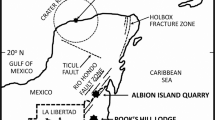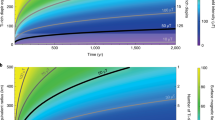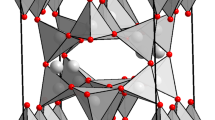Abstract
Two cases are known of rocks containing pyrrhotite, FexS, where 0.80 < x < 1.0, which are reversely magnetized in nature and where the laboratory or geological evidence suggests some form of self-reversing mechanism. These are the Jurassic tuff from Tasmania, studied by Almond et al.1 and the Carboniferous shale from Scotland, studied by Everitt2. Following this lead, the thermomagnetic properties of natural massive pyrrhotite was studied and it was found that some specimens showed partial self-reversal phenomena.
This is a preview of subscription content, access via your institution
Access options
Subscribe to this journal
Receive 51 print issues and online access
$199.00 per year
only $3.90 per issue
Buy this article
- Purchase on Springer Link
- Instant access to full article PDF
Prices may be subject to local taxes which are calculated during checkout
Similar content being viewed by others
References
Almond, M., Clegg, J. A., and Jaeger, J. C., Phil. Mag., 1, 771 (1956).
Everitt, C. W. F., Phil. Mag., 7, 831 (1962).
Néel, L., Ann. Geophys., 7, 90 (1951).
Author information
Authors and Affiliations
Rights and permissions
About this article
Cite this article
BHIMASANKARAM, V. Partial Magnetic Self-reversal of Pyrrhotite. Nature 202, 478–480 (1964). https://doi.org/10.1038/202478a0
Issue Date:
DOI: https://doi.org/10.1038/202478a0
This article is cited by
-
Preliminary paleomagnetic and rock magnetic results from 17 to 22 ka sediment of Jeju Island, Korea: Geomagnetic excursional behavior or rock magnetic anomalies?
Earth, Planets and Space (2018)
-
Metastable Iron Sulfides
Inorganic Materials (2005)
-
Some studies in thermal demagnetization of basic rocks from the Mull area of northern England
Pure and Applied Geophysics PAGEOPH (1971)
Comments
By submitting a comment you agree to abide by our Terms and Community Guidelines. If you find something abusive or that does not comply with our terms or guidelines please flag it as inappropriate.



